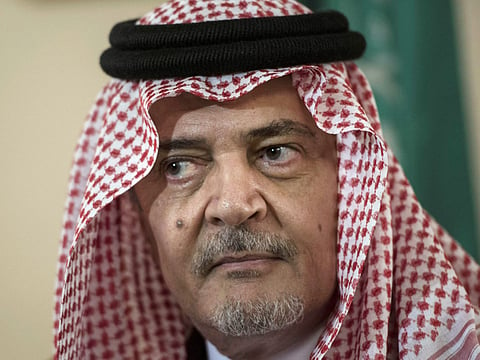An apprentice who became an architect
Prince Saud Al Faisal helped articulate, defend and promote Saudi interests

It does not matter, of course, what others might think of Prince Saud Al Faisal’s legacy. The audience that matters is the Saudi, where citizens acknowledged that their legendary foreign minister was a consummate Arab, someone who earned the rarest of trusts from elites and ordinary figures alike.
To be sure, outsiders recognised his wisdom and skills as a diplomat even if they mistakenly added “that wisdom alone [was not] enough to solve problems,” especially with respect to various crises “that surrounded the United States-Saudi relationship”. For David Ignatius (Washington Post) Prince Saud had “innate caution often frustrated Americans, who wanted the kingdom to be more engaged and active on America’s agenda for the region,” though he added that “US officials often didn’t listen carefully enough”.
For the renowned historian Madawi Al Rasheed, who described him in The Independent as “the soft diplomatic face of the monarchy rather than the power behind it”, Prince Saud failed to achieve great successes even if he tackled “challenging foreign relations”. Al Rasheed pointed out that King Salman Bin Abdul Aziz replaced him with a non-royal, which apparently meant that “Saudi Arabia appeared to have abandoned its careful diplomacy in favour of a more hawkish military interventionist foreign policy in the Arab world”.
Historians and political scientists will long quibble about Prince Saud’s contributions. Still, few can deny that he, as an apprentice in his father’s workshop, added significant value to his country and the Arab world. In fact, he was much more than a mere representative of the kingdom on the world scene, since Kings Khaled, Fahd, Abdullah and Salman, along with all of the country’s heirs and senior royals, relied on Prince Saud to a far greater degree than many assume. If he was entrusted with critical portfolios, it was simply because every decision-maker understood that when Prince Saud articulated a position he was promoting the interests of the kingdom, bar none.
Deferential positions
Often, and given that so little is actually known about the way policy is made in Saudi Arabia, outsiders perceived his deferential positions in Court as a sign of detachment or even of excessive displays of protocol, though what he projected was nothing more than obedience to his sovereign. He exuded loyalty because that’s what his parents, King Faisal and Queen Iffat instilled in their offspring, a trait that served the Al Saud and Saudi Arabia well. Of course, one can attribute various reasons for any particular trait, though it was amply clear that the parents awakened in the future diplomat a sense of responsibility to help forge policy and, like all successful foreign ministers who looked after their respective countries’ interests, Prince Saud excelled in this rarest art form as he spoke to various audiences with aplomb without loosing sight of what truly mattered.
Yet, there was a whole lot more to Saud Al Faisal, and what distinguished him was his honesty. Naturally, his upbringing contributed to his demeanour, but he also acquired dexterity through his many contacts. A well-travelled man who crisscrossed time zones with ease and civilisations with refinement, Prince Saud was privileged to interact with so many counterparts that few appreciated the kind of impact that such contacts generate, which are bound to influence one’s thinking and disposition.
A voracious reader who spend hours reading myriad reports generated by his diplomats, Prince Saud also delved into the classics and could quote western writers with the same eloquence he recited Arabic poetry. Indeed, early on, his mother instilled a love of learning that, without exaggeration, changed his life in ways that few realise today. This was, of course, a family characteristic, but stood out in Prince Saud’s case because of his duties that, by sheer necessity, required him to be familiar with global powers that devised and determined international peace and security.
Several opportunities arose to interact with Prince Saud in the course of composing two separate studies on King Faisal and Queen Iffat. Manoeuvring through counsellors and advisors who managed his schedule, the late foreign minister somehow found the time to interact with a curious academic, answering questions and clarifying obscure points. When describing his mother at the end of a long interview, Prince Saud opined that Queen Iffat Al Thunayan was a “woman of vision, but was much more than a mother, she was a teacher, a doctor, a mentor, a friend”. He had tears in his eyes as he spoke about his mother, and the impact she had on him: “My mother had the patience of a saint and the energy of a lioness,” he stated, relieved to talk about the person who passed on to him the sense of duty.
It was an emotional moment as he looked me straight in the eyes, reflecting on his own words, someone who clearly was conscious of what it meant to serve a nation. Someone who was attentive to duty, loyalty, and identity, not for any self-aggrandizement purposes, but to leave a legacy worthy of emulation.
Dr Joseph A. Kechichian is the author of Iffat Al Thunayan: An Arabian Queen, London: Sussex Academic Press, 2015.


